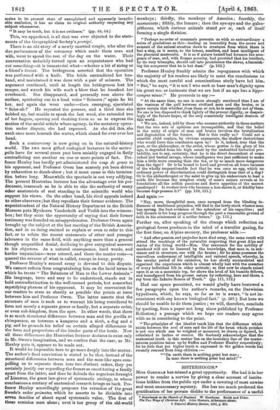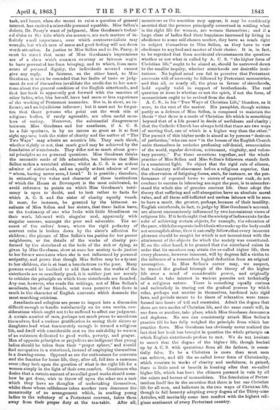SISTERHOODS.* Miss Goonmes has missed a great opportunity. She had
it in her power to render a service by giving a clear account of institu tions hidden from the public eye under a covering of most unwise and most unnecessary mystery. She has too much preferred the gratification of her private dislike to the performance of a useful
1. Sisterhoods in the Church of England. W. Good/Pint. Smith and Elder. 27te Two Ways of Christian Life. John Masters, Alden/gate street.
+ Natural History Review, 1251, p. 215.
task, and hence, when she meant to raise a question of general interest, has excited a miserable personal squabble. Miss Sellon's defects, Dr. Pussy's want of judgment, Miss Goodman's techni- cal claim to the title which she assumes, are each matters of in- finitely small importance, over which controversialists may wrangle, bat which men of sense and good feeling will not deem worth attention. In justice to Miss Sellon and to Dr. Pusey, it must be stated that some of Miss Goodman's imputations are of a class which common coartesy or fairness ought to have prevented her from bringing, and to which, from mere sense of personal dignity, the individuals accusal cannot give any reply. In fairness, on the other hand, to Miss Goodman, it mast be conceded that her faults of taste or judg- ment do not of themselves invalidate the credit due to her asser- tions about the general condition of the English sisterhoods, and th it her book is apparently put forward with the sanction of other ladies, who, like herself, have had more or less experience of the working of Protestant nunneries. She is, in short, an in- former, and an injudicious informer ; but it must not be forgot- ten that those persons who point out the weak side of religious bodies, if rarely agreeable, are often useful me,m- bars of society. Moreover, the substantial disagreement between Miss Goodman and her assailants, if A. C. S. be a fair specimen, is by no means so great as it at first sight appears; both the sister of charity and the author of "The Two Ways" may admire an ascetic's life. They each think, whether rightly or not, that much good may be achieved by the foundation of sisterhoods. They differ not so much about gene- ral principles as on personal questions. Miss Goodman thinks the monastic mode of life admirable, but believes that Miss Sellon makes a wretched abbess; whilst A. C. S. is an ardent admirer of sisterhoods, and an equally ardent admirer of one " whom, having never seen, I loved." It is possible ; therefore, in estimating the value and character of those institutions of which the House at Davonport is the most celebrated, to avoid reference to points on which Miss Goodman's testi- mony is open to doubt, and to look rather to facts for which A. C. S. and the sister of charity equally vouch. It must, for instance, be granted by the bitterest as- sailants of Miss Sellon and her sisters, that these ladies have, on the testimony of one who looks with little friendliness on their work, labourel with singular zeal, apparently with singular success, amongst the poor and miserable. The ac- count of the sailors' home, where the rigid pedantry of convent rules is broken down by the sister's affection for children ; the picture of Miss Sellon's tea parties for her poorer neighbours, or the details of the works of charity per- formed by the sisterhood at the beds of the sick or dying, as given by Miss Goodman, show at once her anxiety to do justice to her former associates when she is not influenced by personal antipathy, and prove that though Miss Sellon may be a tyrant to her children, she is at least a benefactress to the poor. Many parsons would be inclined to add that when the works of the sisterhoods are so manifestly good, it is neither just nor seemly to criticize the principle on which these sisterhoods are founded. Any one, however, who reads the writings, not of Miss Sellon's assailants, but of her friends, must soon perceive that there is much in the character of English convents which demands the most searching criticism.
Assailants and eulogists are prone to import into a discussion difficult enough to handle satisfactorily on its own merits, con- siderations which ought not to be suffered to affect our judgment. A certain number of men, perhaps not much prone to asceticism themselves, find a curious gratification in seeing their sisters or daughters lead what inaccurately enough is termed a religious
life, and dwell with considerable zest on the suitability to women of an existence dedicated to goad works, poverty, and prayer. Men of opposite principles or prejudices are indignant that young ladies should be taken from their "proper sphere," and should find occupation in a sisterhood, instead of employing themselves In a drawing-room. Opposed as are the enthusiasts for convents and the fanatics for home life, they, after all, fall into a common error ; they look upon the question of what is the right life for a woman simply in the light of their own comfort. Gentlemen who desire that a certain amount of so-called good works should some- how be got done, wish to throw off upon the other sex a task Which they have no thoughts of undertaking themselves, whilst those whose selfishness takes another turn denounce the monstrosity of an arrangement which, in sending young ladies to the refectory of a Protestant convent, takes them away from their proper duty at the tea-table. After all, monstrous as the assertion may appear, it may be confidently asserted that the persons principally concerned in settling what is the right life for women, are women themselves ; and if a large class of ladies find their happiness increased by living in obedience to some self-chosen mother, they have as much right to subject themselves to Miss Sellon, as they have to vow obedience to any lord and master of their choice. It is, in fact, to be regretted that from accidental circumstances the question whether or not what is called by A. C. S. "the higher form of Christian life," ought to be aimed at, should be narrowed down to the smaller inquiry, whether sisterhoods are desirable insti- tutions. No logical mind can fail to perceive that Protestant
convents will of necessity be followed by Protestant monasteries,. and that all, or nearly all, the pleas in favour of sisterhoods, hold equally valid in support of brotherhoods. The real question at issue is whether or not the spirit, if not the form, of monasticism ought to be revived from the dead.
A. C. S., in his "Two Ways of Christian Life," blunders, as it were, to the root of the matter. His pamphlet, though written partly as a defence of Miss Sellon, is composed to maintain the thesis " that there is a mode of Christian life which is something beyond that of a life passed in deeds of usefulness and charity ; that the Catholic Church has always held that there are two ways of serving God, one of which is a higher way than the other." The pursuit of this higher mode is aimed at by persons "desirous of perfection," who can now "in the bosom of the English Church unite themselves in societies professing self-denial, renunciation of the world, regular devotion, retirement, virginity, and volun- tary poverty." Put these assertions together, and the whole practice of Miss Mon and Miss Sallon's followers stands forth in a consistent light. To object that the rigid rule of silence,. that voluntary self-abasement before a religious superior, that the observation of fatiguing forms, such, for instance, as the per- formance of repeated bows to sisters of superior rank, do not conduce to success in labouring amongst the poor, is to misunder- stand the whole aim of genuine convent life. Once adopt the theory that suffering and self-abnegation have an absolute moral value, and all these self-inflicted and useless labours will be seen to have a merit, the greater, perhaps, because of their inutility. English sisterhoods, in fact, to judge by Miss Goodman's account, are almost unconsciously influenced by two inconsistent views of religions life. If it be thought that the society of ladies exists for the sake of achieving certain objects, for example, the education of the poor, which the separate individ ualswl, o make up the body could not accomplish alone, then it naturally followsthat every innocent pleasure should be sought for which is not inconsistent with the attainment of the objects for which the society was constituted. If, on the other hand, it be granted that the sisterhood exists in order that its members may attain the so-called higher life, then every pleasure, however innocent, will by degrees fall a victim to the influence of a remorseless logical deduction from an original assumption. In Miss Sellon's career may, we suspect, be traced the gradual triumph of the theory of the higher- life over a mind of considerable power, and originally inclined to take interest in various pursuits not technically of a religious nature. There is something equally curious and melancholy in tracing out the gradual process by which rules, perhaps not unwise in themselves, hardened into rigid laws, and periods meant to be times of relaxation were trans- formed into hours of toil and constraint. Admit the dogma that there are two modes of Christian life, and the same result will, in one form or another, take place, which Miss Goodman denounces and deplores. No one can consistently attack Miss Sellon's practice till he has fully weighed the principle from which her practice flows. Miss Goodman has obviously never realized the fact that her book has brought in question the whole principle on which English sisterhoods profess to rest. We do not hesitate to assert that the dogma of the higher life, though backed up by A. C. S. with quotations from all the fathers, is essen- tially false. To be a Christian is more than most men can achieve, and till the so-called lower form of Christianity, which consists in works of charity and usefulness, is gained, there is little need or benefit in hunting after that so-called higher life, which has been the chimera pursued in vain by all the saints and heroes of monasticism. The foundation of Protes- tantism itself lies in the assertion that there is but one Christian life for all men, and believers in the two ways of Christian life, though in full honesty adopting every dogma of the Thirty-nine Articles, will inevitably come into conflict with the highest reli- gious sentiment of every Protestant country.































 Previous page
Previous page